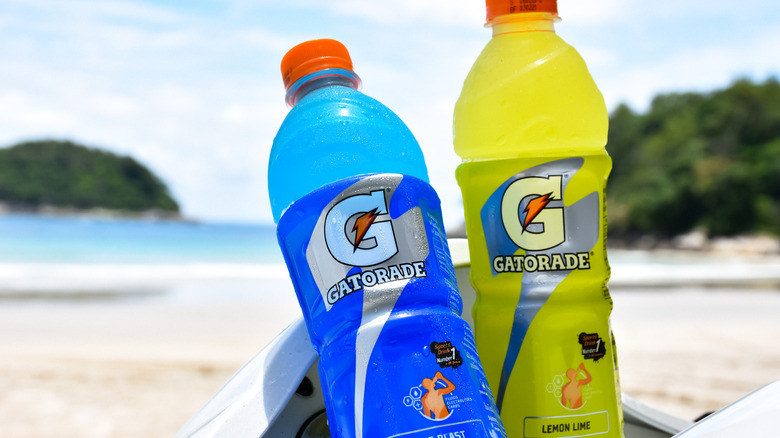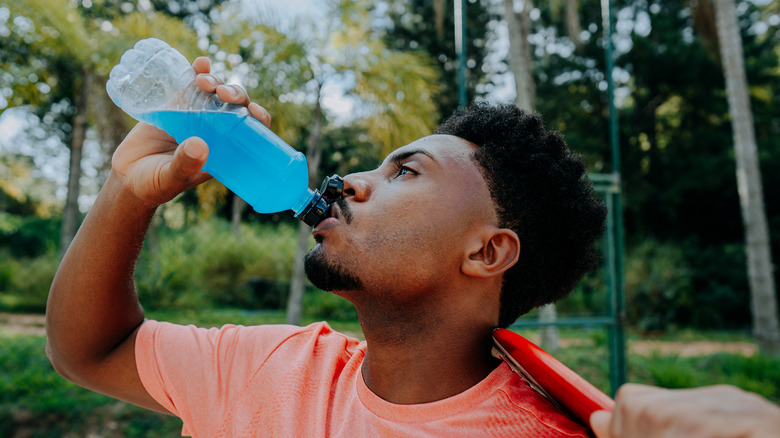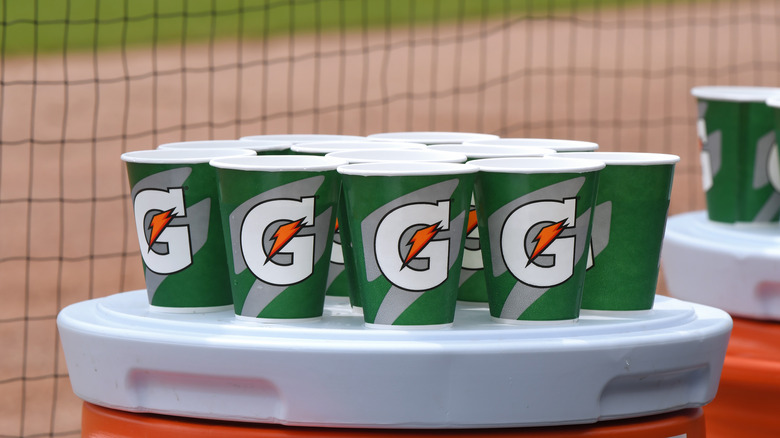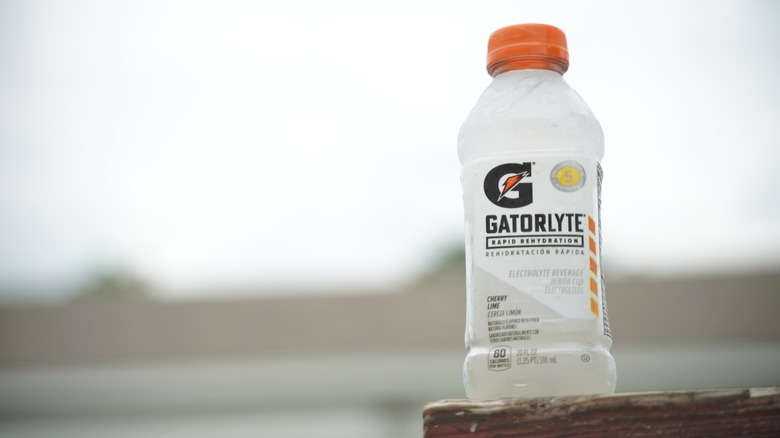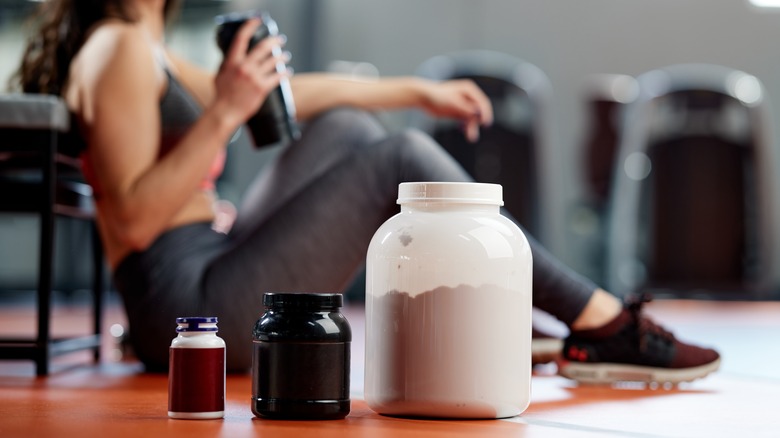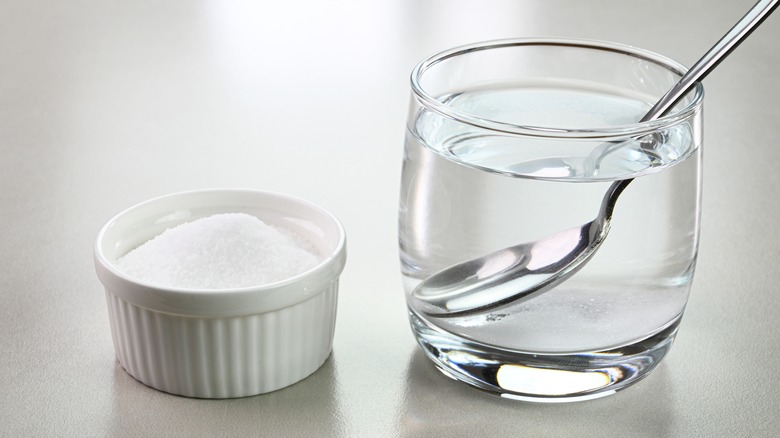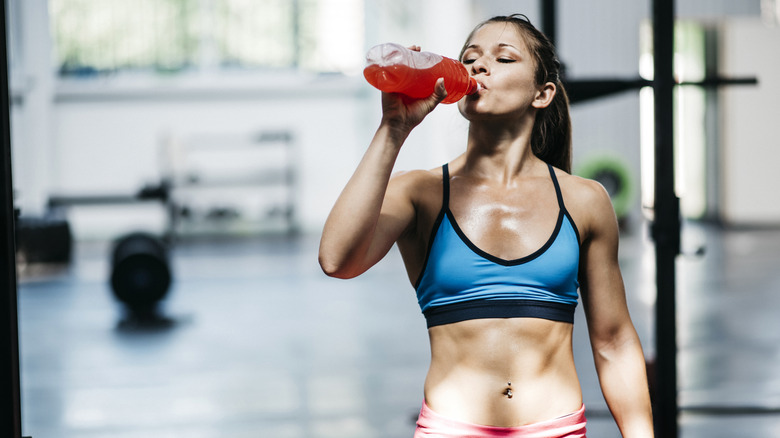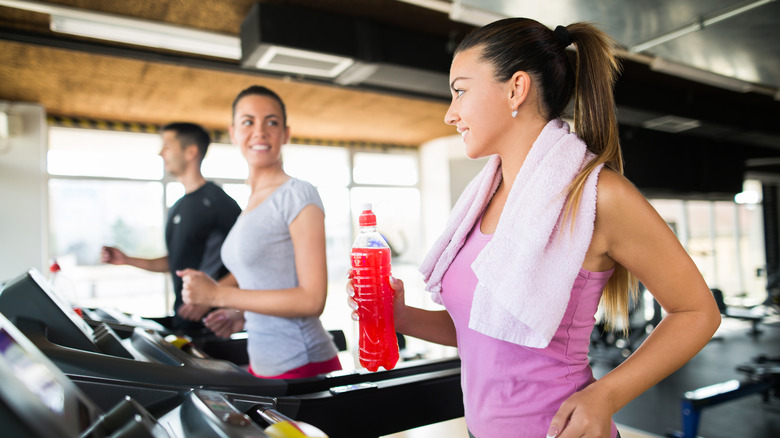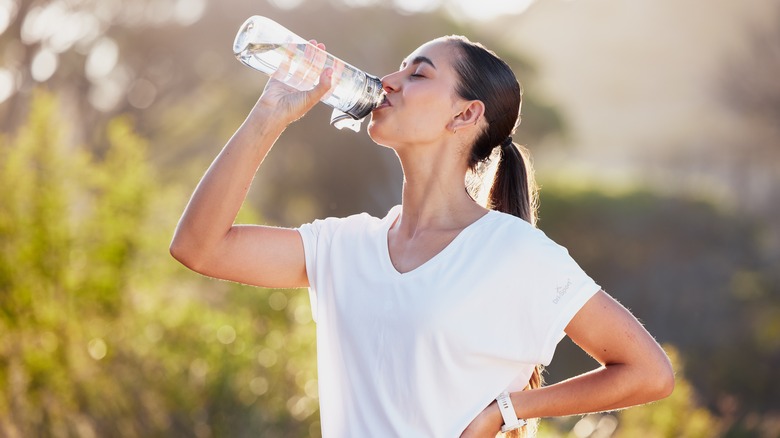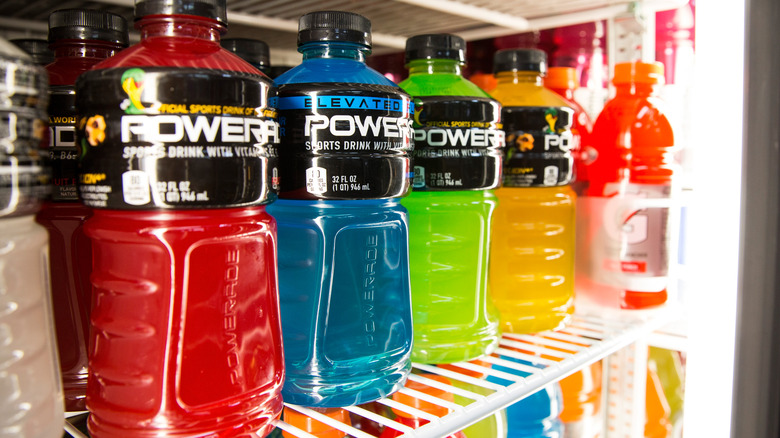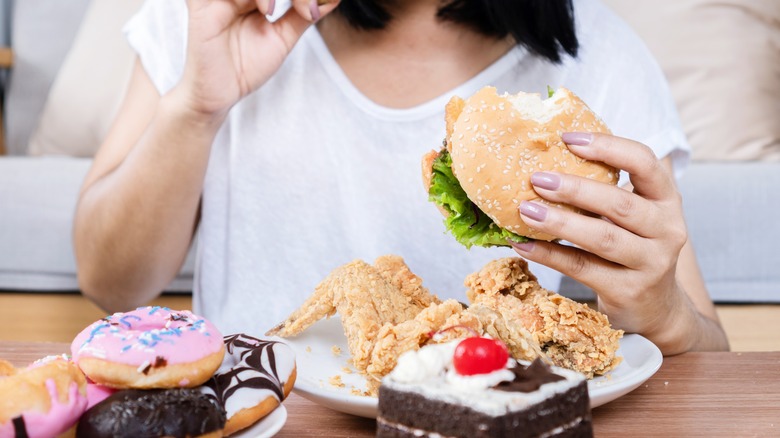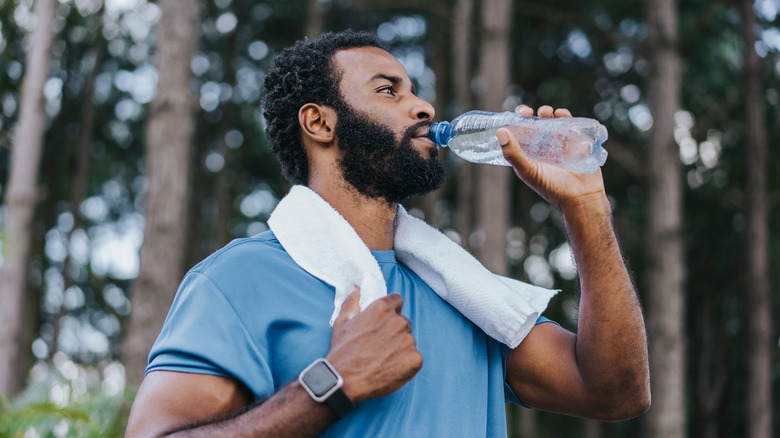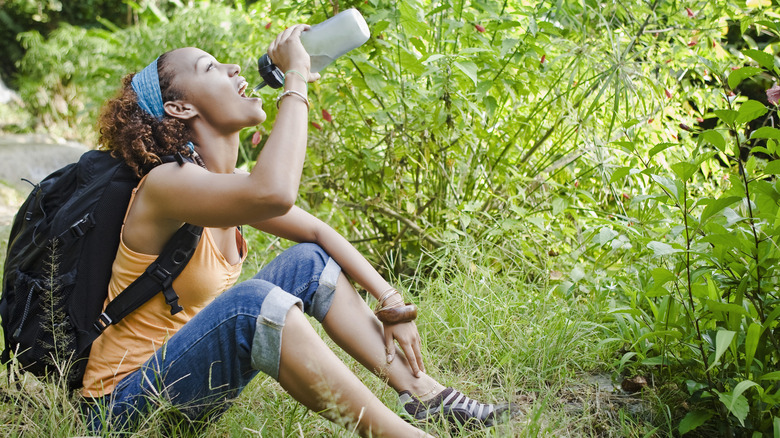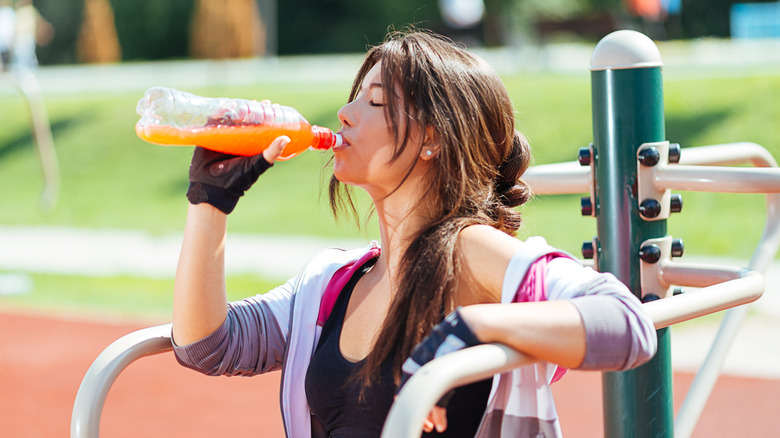The Dos And Don'ts Of Hydrating With Sports Drinks
There are plenty of times that you might be likely to reach for a sports drink. Maybe you just finished up a strenuous workout. Maybe you're hungover from a night of a few too many cocktails. Maybe you're feeling dehydrated after spending the day in the sun. Whatever the case, it's commonplace to reach for one of the drinks — and isn't that what you're supposed to reach for when you're particularly dehydrated? Won't it replenish your electrolytes, or something to that effect?
Well ... not always. Part of the strange untold history of sports drinks is that not all of them are equal and not all sports drinks are a good fit for rehydration under every circumstance. You may not even be sure what it actually means when a drink contains electrolytes. Are you even familiar with what's in sports drinks? They're not water. They're not juice. They're not soda. So, what's going on? To learn more, we spoke with three experts to get the real truth on when you should and shouldn't hydrate with sports drinks, as well as how to choose the best sports drinks for your health. Here's what they had to say.
Do: Choose sports drinks if you'll be doing high-intensity activities for over an hour
There are some circumstances when it is entirely appropriate to drink sports drinks. "Sports drinks are beneficial for individuals engaging in prolonged or intense physical activity lasting over 60 minutes, as they are formulated to enhance endurance," explained Joeleen Stocker, MS, RD, CSP, LDN, manager of nutrition services at Mount Nittany Medical Center.
Stocker said that sports drinks are specifically designed to replenish water and electrolytes, including electrolytes that are often lost when you sweat. Additionally, some sports drinks are made with added flavors that can increase fluid intake (the better something tastes, the more likely you are to drink it, after all). They can also contain energy-boosting ingredients, like caffeine or B vitamins. Tami Best, MS, RDN, IFNCP, a functional and integrative dietitian with Top Nutrition Coaching, likewise noted that sports drinks also often contain easily digestible carbohydrates that can increase endurance.
Do: Choose sports drinks with potassium and sodium
If you're looking for a sports drink that will actually rehydrate you and replenish water, electrolytes, and energy, there are a few ingredients you'll want to look for. Specifically, as Best noted, you should opt for a sports drink that contains potassium and sodium, as these electrolytes are the ones that we lose the most during strenuous activities.
Furthermore, the sodium in sports drinks can increase fluid retention and prompt you to drink more fluids overall (similar to how eating salty foods may make you feel bloated or push you to drink more). Potassium, meanwhile, can help you avoid muscle cramps, which is one of the reasons why bananas, which are naturally high in potassium, are a favorite snack for athletes. In fact, research like this 2012 study published in PLoS One suggests that bananas might be more beneficial to athletes than sports drinks (though the research was funded by Dole Foods, so it should be taken with a grain of salt).
Do: Choose sports drinks with a variety of carbohydrate sources
It's not just potassium and sodium you should look for in a sports drink, Best said. "Selecting a drink that has a variety of carbohydrate sources helps to optimize the body's absorption and the muscle's utilization of the carbohydrates," she noted. "Sports drinks with only one type of carbohydrate can slow gastric emptying, which can cause stomach upset and hinder performance. Sports drinks with low-calorie natural sweeteners such as stevia or monk fruit are good choices if you are aiming to control carbohydrate intake."
So what will carbohydrates look like on your favorite sports drink's nutrition label? In short, for sports drinks, carbohydrates equal sugar. This sugar may appear in many forms, including sucrose (table sugar) or glucose (often in the form of high fructose corn syrup). However, you may want to steer clear of high fructose corn syrup in your sports drinks, or in any foods, for that matter. High fructose corn syrup comes with a range of potentially negative side effects, including an increased risk for diabetes, inflammation, and non-alcoholic fatty liver disease.
Do: Consider sports drinks that contain protein
Protein in your sports drinks? While you may think of protein shakes when the topic arises, rather than your typical Gatorade or Powerade, if you're shopping around for a sports drink, consider going with an one that also gives you protein. As Best recommended, "For ultra-endurance athletes, it may be worth considering sports drinks that contain protein, in addition to carbohydrates and electrolytes, to slow the time to fatigue and reduce muscle breakdown."
While your average bottle of Gatorade isn't going to contain protein, you do have other options. Protein2o, for example, contains electrolytes as well as 20 grams of protein, which is 40% of your daily recommended intake. Ready protein water contains the same amount of protein, five electrolytes, and no sugar or artificial dyes. PWR Lift is another option with 10 grams of protein and 650 milligrams of electrolytes, including sodium, potassium, and magnesium.
Do: Consider making your own sports drinks at home
Let's be real: sometimes, it's difficult to navigate all the nutrition labels at the grocery store. Perhaps it's just easier to make your own whatever-it-is at home — yes, including sports drinks. Plus, if you're drinking sports drinks regularly, the cost is going to add up. Luckily, multiple experts we spoke with recommended making your own potentially unexpected alternatives for sports drinks at home with ingredients you already have on hand.
Lena Bakovic, MS, RDN, CNSC, registered dietitian specializing in chronic disease, weight management, gut health, oncology, and general health and wellness with Top Nutrition Coaching, said you can simply mix half a teaspoon of salt, half a teaspoon of sugar, and one liter of water for hydration with both sodium and carbs.
Need more flavor? Best said you could mix two cups each of orange juice and water with a quarter teaspoon of Himalayan salt and lemon juice to taste. She also recommended adding a pinch of Himalayan salt to coconut water, which is already a good source of potassium. She noted that maple water is another option, as it's lower in sugar than coconut water, but also contains electrolytes.
Do: Drink a sports drink an hour prior to strenuous activity
Picking a sports drink with the right ingredients isn't the only thing you have to think about when picking one that will give you the most benefits. You also have to think about exactly when you quaff your sports drink.
While you might think that you should drink your sports drink right after your workout — after all, this is when you've sweat a bit and depleted your electrolyte stores — instead consider having a drink before you work out for even more benefits. According to Best, "If your activity or exercise is going to last longer than an hour and will be strenuous, consuming a sports drink one hour prior to the start of your activity can help to top off your body's glycogen stores, [which are] the way your body stores carbohydrates to be used for energy."
Do: Consume your sports drink every 15-20 minutes during strenuous activity
So, let's say you're planning on participating in a pretty strenuous activity, like working out, playing a favorite sport, or doing some yard work in the sun. You had your sports drink before you started, so now you should be good to sip at your leisure, right? Well, not really. While the sodium in sports drinks may inspire you to sip a little faster, keep an eye on how quickly you are drinking to ensure you're really getting enough hydration during your activity. While you're at it, make sure you're drinking enough after your activity has ended.
According to Best, "For training or events extending beyond an hour, sports dietitians recommend drinking three to eight ounces of sports drinks every 15 to 20 minutes. Following the workout or sporting event, aim to have 16 to 24 ounces of fluid for every pound lost during the activity."
Don't: Drink sports drinks when they're not necessary
While sports drinks can be useful for endurance athletes or others who are active for more than an hour at a time, the same drinks aren't always necessary under different conditions. In fact, because of the extra carbohydrates (in this case, sugar) in sports drinks, you could be doing yourself more harm than good by doubling down on unnecessary sugars that may not be the best choice for your body.
"Sport beverages are generally high in sugar content, providing calories sourced from simple sugars, which most people do not require," said Bakovic. "Non-athletes are instead more likely to benefit from water for hydration purposes."
Stocker agreed, saying that in quite a few cases, it's best to just stick with water. "For those involved in light to moderate physical activity or high-intensity exercise lasting 60 minutes or less," she said, "water remains the optimal choice for hydration."
Don't: Drink sports drinks filled with artificial colors and sweeteners
In addition to the extra sugar often found in sports drinks, many also contain artificial colors and sweeteners. Not only are these ingredients sometimes provenly linked to negative health effects — as when a 2021 joint study linked artificial dyes to hyperactivity in some children – but some may be avoiding them due to personal preference, as Bakovic pointed out.
According to Bakovic, it's best to "Steer clear of sports drinks that contain artificial colors such as those with red, blue, or yellow dyes. These may be particularly harmful to children and teens, as some studies show a connection between hyperactivity disorders and intake of these chemical dyes. Likewise, avoid those with artificial sweeteners such as sucralose or acesulfame K. Similarly, avoid those drinks that contain sugar alcohol, such as erythritol or sorbitol, as these have the potential to cause gastrointestinal distress." She also noted that some consumers may be sensitive to the artificial sweeteners found in some sports drinks.
Don't: Think sports drinks can compensate for poor lifestyle factors
Some may rave that sports drinks benefit their performance, with devotees claiming that fueling up with their favorite sports drink an hour before their strenuous activity makes all the difference in the world. However, it's important to not overestimate the power of a sports drink. While they may be able to provide extra hydration and electrolytes, sports drinks aren't miracle workers and simply can't compensate for poor lifestyle factors.
As Stocker noted, "Sports drinks cannot improve performance if an individual is not maintaining a balanced diet, getting adequate sleep, and allowing for sufficient recovery time between practices and competitions." So, as you get ready for your next big workout, think not only about what sports drink will keep you hydrated, but also how your nutrition choices, sleep, and other choices may also be impacting how well (or not) you perform.
Don't: Drink sports drinks if you have certain health conditions
Artificial ingredients and added sugar aside, sports drinks are relatively benign for many people. Yet some individuals should be sure to approach sports drinks with extra care.
Anyone with conditions like "chronic kidney disease, gout, diabetes, or hypertension," said Bakovic, "may be especially sensitive to the electrolyte content in sports drinks, which can sometimes pose harm for these specific population groups. Some of these folks are sensitive to sources of added fluids. For these reasons, it is recommended to have a hydration plan with the help of a RDN in collaboration with one's physician."
Stocker mentioned that the use of sports drinks among children should also be closely monitored. Studies like this 2017 paper published in Paediatrics & Child Health have suggested that frequent consumption of sports drinks could contribute to obesity in children. Instead, water should be the first choice for children's hydration needs. For children drinking sports drinks for hydration and electrolytes during illness, oral rehydration solutions are recommended instead of sports drinks.
Don't: Overlook the power of good ol' fashioned water
One thing all of our experts readily agreed on is that there is no replacement for plain water. This is precisely what most of us need, rather than any fancy sports drinks packed with electrolytes, protein, sugar, and other ingredients.
If you're the type to turn up your nose at boring old water, don't feel like you have to settle for just a cool glass straight from the tap. As Bakovic explained, "Water can be infused with different varieties of fruits, vegetables, and herbs to provide a different flavor profile while remaining low in calories and free of sugar."
Even if you're going to be outside in the summer sun, Best said that water is probably still good enough for your hydration needs. Of course, exceptions apply if you are going to be in the heat for an extended period, or if you were doing strenuous activities that lasted more than an hour.
Methodology
For this article, we interviewed three medical experts: Tami Best, MS, RDN, IFNCP, functional and integrative dietitian with Top Nutrition Coaching; Joeleen Stocker, MS, RD, CSP, LDN, manager of Nutrition Services at Mount Nittany Medical Center; and Lena Bakovic, MS, RDN, CNSC, registered dietitian specializing in chronic disease, weight management, gut health, oncology, and general health and wellness with Top Nutrition Coaching.
